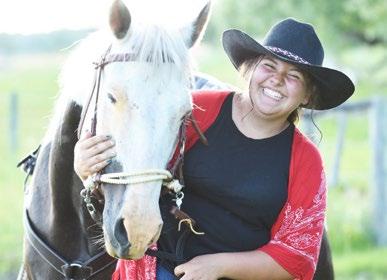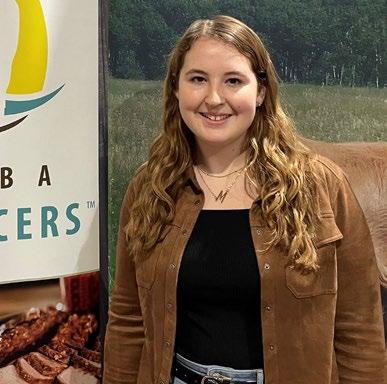
13 minute read
MBP Scholarship Recipients What the beef industry means to my family, my community and Manitoba
HANNAH DERKSEN
It does not take an expert to spot the benefits of the beef industry at all levels in our world, from its impact on personal growth to its economic power, and everything in between.
I was not lucky enough to grow up on a beef farm like many other young producers, but I believe this has allowed me to develop a true passion for the industry as an onlooker, from the outside in, first. For me, participating in this great industry was a choice I had to actively make and pursue, and I wouldn’t have it any other way. Growing up, I was fortunate enough to have an uncle who exhibited a tangible love for raising cattle and found joy in showing others his lifestyle. This is where my first exposure to the beef industry was, and those early steps eventually led to me starting my own herd while pursuing and entering veterinary school. Cattle are the world to my uncle, and while working alongside him wasn’t always easy, it didn’t take long before I could see why. There is nothing better than watching the cattle you truly care for grow and mature after the countless hours of hard work you put in to ensure that they succeed.
Harleigh Carlson


I have grown up within the beef industry and the 4-H community my whole life as my family and I operate Up the Creek Cattle Company Ltd. We breed and raise purebred Shorthorns that we also show at various shows across the province of Manitoba. Growing up on the farm has taught me many very important skills and life lessons. It has also started and fueled my passion for ag education.
I bought three ewe lambs in the fall of 2018, to go in a Mobile Educational Livestock Display (MELD) that my sister, Taylor, and I created to educate people who live in urban areas about where their food comes from. This display was part of the pilot year of a new program being offered at school called STRIVE (Self Taught Real-World Independent Valuable Experience). The goal of the project was to take a topic/idea that you are passionate about and create a project based on a school curriculum. My sister and I received an entrepreneur business credit from this project.
Every time we presented our display, we brought: a bull, a steer, a heifer, a cow/calf pair, two pigs, two sheep, and two goats. We went to three schools and three fairs in 2019. On average, we saw one thousand
Sydney Gerelus
The beef industry is not just an industry with the sole purpose of making money. It is an industry filled with passionate and hardworking producers who dedicate themselves daily to raising their cattle and producing top quality beef in an efficient and environmentally friendly way for those around us to consume. The beef industry is, without a doubt, of huge importance to my family. Being raised on my family’s beef and grain farm has shown me firsthand the passion and dedication that beef producers have for their operations and the animals they are raising. Over the years I have become accustomed to the early mornings and late nights that come along with this lifestyle and have grown to enjoy the hard work we put in daily despite all the setbacks and complications that come our way. As a family in this industry we are able to work alongside one another to care for and raise our animals. Although working with cattle may not always be the easiest job in the world, there are not many other lifestyles that allow you to go to work every day with your family beside you. It brings us all great pride to know that the animals we raised will provide for others.
As a vet student, I have had the privilege to work with many beef producers in the area, which has given me a unique perspective regarding their impact on our community. From this, it has become apparent to me that they are the community. They not only support each other through the ups and downs, but are always willing to lend a helping hand to those in the area, whether it be in the form of donations, physical labour or volunteer time. It is inspiring to see them battling through the tough years they encounter together, while still having the graciousness to help their neighbours. These producers also provide jobs to those in the community and teach them the work ethic, determination and tenacity that is needed to succeed in this industry. Some of these employees may go on to other jobs in the area, but with these traits they will continue to build up our community, contributing in a positive way.
Many of these communities make up the patchwork of the vast Manitoba prairies and are largely responsible for keeping our natural grasslands healthy and flourishing. Through responsible grazing, beef producers have the unique opportunity to preserve the beautiful landscape of Manitoba, while contrib- people per day. When we went to the schools, we arrived early enough so that we could set up before the kids got there and stayed until they were all gone. While there, we tailored individual discussions and topics based on the age of the children. When parents came to pick students up, the kids dragged their parents over to see the animals. We had just as many conversations with parents as we did with kids. This was such an amazing opportunity to bring ag education to urban children; I hope to continue to do this in the future. I have also helped present to Early Years classrooms through the amazing Ag in the Classroom-Manitoba programs as a volunteer. uting to one of the most powerful carbon sinks. With a push towards regenerative agriculture in recent years, cattle farmers already have a head start thanks to our powerful energy converting fertilizers. Beyond this, the beef industry contributes to our province’s economy due to the commitment producers have to raising healthy high quality beef to enter our food supply.
Bringing our display into different communities allows people to reconnect with farming. We’ve seen many times parents telling their kids about their grandparents’ farms, especially at the fairs. In past years, we have brought cattle for the Manitoba Beef Producers to use in their displays at the Royal Manitoba Winter Fair and the Red River Exhibition. We were happy to do that because we were able to start to build the farm-to-table connection between the children and their families.
To me, this industry relies on the 4-H organization to raise the next generation of beef producers.
Growing up in the Shoal Lake area, agriculture is all around and it is not uncommon to run into other local producers who never hesitate to say hello and chat about the ever changing industry in which we belong. Being a small farming community, many businesses rely on the beef industry and the producers in it.
Whether it is the equipment dealerships, the veterinary clinic or feed suppliers, they all provide for our industry and in return we support them. This is a prime example of how small agriculture communities, like Shoal Lake, have local producers working with businesses to reach both of their goals. The beef industry has helped create many jobs in my community and I was grateful to have spent almost two years working at the local veterinary clinic.
As one of the top beef producing provinces in the country, it is obvious that the beef industry is crucial to Manitoba and its economy. Our province is a major supplier to Canada’s beef industry as a whole which shows how much work is put in by producers and others in the industry. The industry is also responsible for many employment opportunities within the province due to the vast amount of services needed to be as successful as it is.
It is clear that the beef industry is a special one, with the power to bring families closer together, foster community, impact our ecosystems and fuel our economy. I don’t know another industry where all this is so easily possible, and I’m as equally glad to be a part of it, as I am thankful to those who make it up.
Most of my involvement in the beef industry has been through 4-H. I have been able to build connections with people all over the province. 4-H has taught myself many skills that are very useful as a producer. For example, some of the skills I used in college and will use after I graduate are: evaluating/judging cattle, feeding and caring for stock, and how to communicate with others and run meetings.

In the end, I would not be the same person I am today without the beef industry. I wouldn’t have as many connections, life skills or my passion for ag education.
Being a part of the beef industry and lifestyle has shaped me into the individual I am today and has definitely influenced my strong passion for animals and agriculture. My time spent working with our cattle and on our farm has taught me many valuable lessons and skills that I will use throughout my life. I consider myself lucky to have been raised as a part of this industry and to have had the opportunity to experience what it truly means to be a beef producer.
Lainie Muir

In 2019 there were 1,080 000 head of cattle on 6,465 farms (Manitoba Agriculture and Resource Development) in Manitoba. Our province ranks third in beef production, home to 11% of Canada’s national population. I will move behind the scenes of the industry’s social responsibility, environmental influence and economic viability in the province and focus on an aspect of the beef industry that may not receive as much attention. That is, some of the most significant effects the industry has on those who are at the root of it all; the producers. Beef production provides a sense of community, appreciation and purpose for those who choose to pursue it as their profession.

Beef producers face a lot of the same challenges. The successes, and upsets, producers experience are a reflection of fluctuations in the market, climate, land and feed availability. The challenges of the last few years are no secret. My community has seen our land swarmed with grasshoppers, buried in snow and engulfed by water. Meaningful connections are built between cattle farmers when we share how the same challenges have impacted our lives. Whether it be calving, drought, foot rot or anything in between you can count on a fellow producer to understand because of their personal experiences. We can all relate to one another and that creates a secure sense of community throughout the entire province.
In addition to providing a sense of community, the industry gives cattle farmers the ability to appreciate the little things. When you let the herd out to pasture, see calves dashing across a freshly-bedded straw pack or lay some homegrown steaks down on the barbeque you can’t help but feel grateful no matter what life has thrown at you before that moment. In a fast-moving world where little things can be easily overlooked, the presence of beef producers ensures there will always be someone to appreciate the sun, the rain and the green grass.
On top of providing a sense of community and appreciation, the cattle ensure their producers will always serve a purpose. In an industry of uncertainty, the cattle can often be a constant. Not in the sense that they will always stay the same; we all know you can think you’ve seen it all and then you find a heifer on the roof of your barn, but in the sense that as a beef producer you serve a purpose every day. The 24/7 responsibility of managing beef cattle is a blessing more than anything. The life of your livestock and the plants that fuel them are in your hands. The cattle must always be fed. Having a responsibility that remains constant has helped myself and many other cattle producers take things day by day until the hard times get a little easier.
Manitoba beef production creates a sense of community and purpose, and a reminder to appreciate the little things. It is true that raising beef cattle is a business, producers must put food on the table, but first and foremost it is a way of life. A humble, honourable, and at many times rewarding way of life. Adversity forces cattle producers to simplify their lives and see what is most important. Our province is filled with natural diversity and compassionate, appreciative people. As long as there are cattle farmers we will stay “Friendly Manitoba.”
The beef industry is a vital part of Canada’s growing economy, providing the country with a sustainable source of nourishment and with hundreds of thousands of acres of preserved grassland. Growing up in this industry has allowed me to truly appreciate all that it does for my family, our community, and Manitoba. This industry means everything to my family because it is our passion and way of life, to our community because it is run by the hard-working farming families throughout it, and to Manitoba because it helps to keep our province essential to the trade of Canada.
For my entire life, I have watched as my parents poured their time, energy, and funds into our cattle and grain farm in southern Manitoba. I watched as they checked the cows every two hours through the night for months to ensure that every calf was delivered. I watched as they worked through until sunrise at harvest to be able to feed the cows over the winter. I watched as they got up each and every morning and did it all over again. Through rain, shine, snow, and drought, my parents have put everything into the beef industry, not because they have to farm, but because they love it and are passionate about it. As my sister and I follow in their footsteps and start to invest ourselves into the farm we realize exactly what the beef industry means to us. Everything.
KATE-LEIGH HEAPY

The beef industry is a crucial part of not just my life but the lives of many Manitobans. It is a way of life for a great number of people and a passion of many from the time they are very young. It means more to me than raising an animal from birth; it is caring for an animal that is like a member of my family. My family provides the cattle herd with everything they need to survive and be their best allowing them to produce healthy offspring or feed Canadian citizens. It is important to my family that each animal is cared for and gets the nutrition and necessities necessary to excel.
The entire industry is such an important part of my family’s life because it allows us to do what we love, do it as a family as well as provide a food source to others. My brother, uncle and grandparents are all members of the beef industry and take great pride in doing so. The beef industry allows my extended and immediate family to remain within the same area and live close to one another. It supplies every beef producer with a way of life, a way to help the environment and a way to feed Manitobans.
The beef industry has allowed me to grow, lead, communicate and make lifelong friends through my
Not only do my parents care deeply about the beef industry, but so does our community, the municipality of North Norfolk. Being a community that is filled largely with grain and cattle operations, the community centres many of their efforts on the farmers that keep the community running. My community appreciates the work that the farmers do from fundraisers to school tours to community events, the beef industry is in every part of our way of life in North Norfolk. The beef industry means a source of sustainability in the community and also a source of pride towards the hard work of the farming community.
The beef industry is also extremely important to Manitoba because it is one of the agricultural products that helps to keep Manitoba relevant for exporting beef in Canada. Manitoba is the third largest beef producing province in Canada with about 12% of the national beef herd that reside on the vast grasslands in the summer and kept healthy on feed in the cold winters. Without the beef industry, Manitoba would have to import beef from neighbouring provinces, which would increase the cost of beef upon the fast-rising inflation rates, making it less affordable for Manitobans to purchase the protein they require.
Overall, Manitoba needs the beef industry to remain a province of strong trade power to the rest of Canada and the rest of the world.
Not only is the beef industry extremely important to my family, my community, and Manitoba, but it is involvement in beef 4-H. My family is incorporating beef bulls into our dairy herd as well in the last few years. We are breeding heifers and cows with fertility problems to beef bulls. The result is getting them in calf to produce milk. The male calves are sold as steers and are producing beef for Manitobans. also important to me. One of the greatest honours in my life is being a part of the beef industry in Canada, where we are able to feed our families, neighbours, and the world. For this reason, I love being involved in and advocating for the beef industry every single day. I also enjoy the people that so graciously devote their time, energy, and money into this industry as well. Last but not least, I love the beef industry because of the animals. From showing cattle, I have been able to learn to appreciate the gentleness of tamed cattle and love working with them every day.
The beef industry is an integral part of my community. My community would not exist without agriculture and the beef industry. There is an abattoir in my community where beef producers take their finished livestock to be butchered. Without the beef industry, the local co-op, credit union, gas station and mechanic shop would no longer be viable. The beef industry is allowing farmers to support all the local establishments and provide them business. Since my community is made up of many beef producers, not having their support would be detrimental. My community is based on and around Manitoba beef producers.
The beef industry within Manitoba is a huge part of our province. So many Manitobans, whether they are farmers producing the beef or buying it in a store, it is important. It produces food for Manitobans to eat and allows people to do what they love daily. The beef industry is such an important part of the economy as well with Manitoba producing the third most amount of beef in Canada.
The beef industry is so important to my family, my community, and Manitoba in so many ways. It gives families a way of life, a chance to do what they love day in and day out. Beef producers can raise kids who know how to care for, love an animal and have a strong work ethic!
I love the agriculture industry as a whole; from checking cows to calve in -40 to milking cows on a +35 summer’s day. I am passionate about the industry and love being out all day with the animals; it gives me a feeling of purpose. I would not change a day in my life spent in the agriculture industry and am so excited for my future in the agriculture industry. It has instilled so many life qualities within myself and I could not be prouder to be a member of agriculture!










